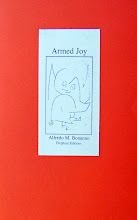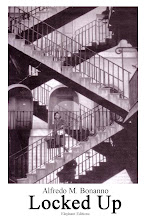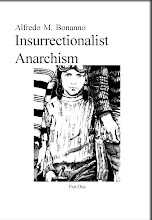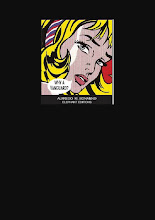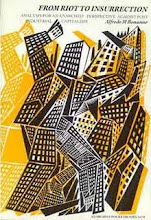From: ‘Rivoluzione, violenza, anti-autoritarismo’, La dimensione anarchica, Catania 1974, pp. 276-281.
The question of the difference between ‘violence’ and ‘nonviolence’ is usually posed wrongly because of the class interests and emotive reactions it triggers off.
State violence and the terrorism of the bosses knows no limits or moral obstacle. Revolutionaries, and anarchists in particular, are quite justified in responding to this violence with revolutionary violence.
Complications arise when we examine the positions of those who support nonviolence. In appearance only do they choose peaceful methods, which when seen in isolation are not violent, i.e. do not physically attack the adversary. When seen within the general framework of the struggle, their interventions (apart from those of organisations who use nonviolence as an alibi to leave things as they are) turn out to be just as violent as those carried out by the supporters of ‘violence’.
A march of ‘pacifist’ demonstrators is itself a violent event which upsets the order of exploitation. It is a demonstration of strength, a show of force. It does not differ from the ‘violent’ demonstration, at least in the choice of objective. From the strategic and revolutionary point of view, the idea of a violent demonstration capable of winning and holding a military victory is unthinkable today. In so saying, we do not mean that we should refuse revolutionary violence. We only mean we must be clear so as to avoid sanctifying the machine gun on the one hand or becoming the policeman of the situation on the other.
A purely verbal distinction between violence and nonviolence is a false one. A well-fed bourgeois can easily ‘theorise’ the most unchained violence against the boss class but only with difficulty will he put it into effect in conditions requiring total dedication to the revolutionary task. Most often his violence is purely verbal. In practice he prefers things to remain as they are because, among other things, that allows him to continue to exercise his fiery rhetoric.
Another equally well-fed bourgeois might feel himself transported to an exaltation of nonviolence, but still as something theoretical, something condemning the negative ‘instincts’ of struggle and violence and sanctifying the positive ‘instincts’ of peace and brotherhood. Only with difficulty however will this bourgeois put his nonviolent ‘principles’ into practice in a total daily involvement in the social struggle. He will prefer the comfort of the situation as it is, where he can carry on with his reflections on peace and brotherhood.
Before speaking of violence and nonviolence a distinction should be made as to whether the question is being applied to a real situation, or whether it is simply an abstract theory and there is no intention of actually applying it. Only in the case of the former is it possible to discuss the strategic and military conditions that render nonviolent methods less effective and more easily overcome by power. But this discussion is one which comes afterwards, it is a question of method and never an abstract one.
We are not interested in philosophical discussions on violence that lead to theories of the hereditary biological violence of the species, etc., which stink of theology. What is important is to approach the struggle in its reality. The rest is a question of choice of means and the best way to put them into effect.
If we are personally convinced that nonviolent methods are unsuitable in the social struggle today, not for this are we against the comrades who see their own dimension of struggle in nonviolent methods. What is important is that the struggle be engaged in seriously, that it not be limited to speaking of ‘nonviolent struggle’ as an alibi so that the police will leave us alone.
Abstract discussions on violence (nearly always fiery and bloody) and just as abstract discussions on nonviolence (nearly always idiotic and paradisiacal) are equally disgusting. We can only respond effectively to the historic crime of exploitation, terrorism, and institutionalised violence with struggle, using any means we choose. The violence (or nonviolence) of words and speeches will change nothing.
skip to main |
skip to sidebar

Some writings of Alfredo Maria Bonanno in English, or almost

Alfredo Bonanno was arrested on October 1st 2009 in Greece, accused of concourse in robbery. With him, anarchist comrade Christos Stratigopoulos.
Here are a few translations and part translations of a small portion of Alfredo's writing. This is a work in progress, many of the translations are as yet incomplete. Open links to find more of Alfredo's work.
Alfredo Bonnano Released
Nov. 22 Alfredo Bonnano was sentenced to 4 years imprisonment (which practically means that with the time served so far and the fact that he is over 70years old HE IS RELEASED
Christos Stratigopoulos (who took responsibility for the action)
was sentenced to 8 years and 9 months with the Greek law will probably be released at the end 2011
BY ANY MEANS NECESSARY
LINKS
click on any of these labels to read text
- "Community" sickness
- 1981 - Editorial
- A Critique of Syndicalist Methods
- A few notes on Sacco and Vanzetti
- A few notes on the revolutionary movement in Italy
- A little man in Singapore
- A million jobs
- A question of class
- Affinity
- After Marx autonomy
- Albania Laboratory of Subversion (Introduction)
- Anarchism and the national liberation struggle
- Anarchists and action
- AND WE WILL ALWAYS BE READY TO STORM THE HEAVENS AGAIN (Against amnesty)
- ANTI-INSTITUTIONAL MOVEMENT
- Are we modern?
- Armed Joy
- ARMED STRUGGLE. SOME REFLECTIONS.
- Autonomous base nuclei
- beyond syndicalism
- Beyond workerism
- But what is the imaginary?
- Class War
- Comiso - Organizational document of the self-managed leagues
- Considerations on illegality
- Dissonances (Introduction)
- Elephant Editions 1986
- Excluded and included
- Farewell to claiming
- Feral Revolution (Introduction)
- FICTITIOUS MOVEMENT AND REAL MOVEMENT
- For an Antiauthoritarian Insurrectionist International - Proposal for a debate
- From riot to insurrection
- From the centre to the periphery
- Good technology
- Guerilla Extraordinary
- Habits and idols
- Hegel
- I know who killed chief superintendent Luigi Calabresi
- Illegality
- Illness and capital
- Informal organisation
- Insurrection
- Internationalism
- Introduction to Sabate
- Introduction to Anarchism and Violence
- Introduction to Bratach Dubh English edition of Malatesta's Fra Contadini
- Introduction to Insurrectionalist Anarchism
- Introduction to Strange Victories
- Introduction to The Conquest of Bread
- Involuntary aspects of voluntary work
- Let's destroy work
- LET'S DESTROY WORK. New introduction
- Let's keep our feet on the ground please
- Lightening Conductors and Stand-ins - more shots of non-news
- Lightning Conductors and Stand-ins
- Lightning Conductors and Stand-ins (cont.)
- Locked up
- Looking forward to self-management
- Loss of language
- More on internationalism
- National Liberation Struggle
- nineteen years on
- No more crises
- Non-news about drugs
- Non-news about racism
- Ode to the Uniform
- On Feminism
- One's life on the line
- Order and chaos
- Otto Ruhle (Introductory Note)
- OUR ROLE IN THE PRESENT CONFLICT
- Palestine mon amour
- Pantagruel anarchist review
- Pinelli
- Prison and Prisoners’ Struggles - Introduction
- Propulsive Utopia
- Quality and the factory
- Restructuring Capital and the new democracy
- Revolution - Violence - Antiauthoritarianism
- REVOLUTIONARY VIOLENCE
- Science and the social revolution
- Self-management
- Severino Di Giovanni in Argentina 1923-1931 by Osvaldo Bayer
- Social banditry
- SOME NOTES -
- Space and Capital
- Stirner
- Stop the City? From information to attack
- Strategy and Methods
- Streamlined production
- The "end" of the crisis
- The aesthetics of anarchism
- The anarchist tension
- The area of autonomy and the anarchist movement in Italy
- The armed wing of science
- The Cruise missile base at Comiso can be prevented
- The ethical bank
- The insurrectional project
- THE LANGUAGE OF TECNICS -
- The logic of insurrection
- The moral split
- THE NECESSARY DESTRUCTION -
- The priority of practice
- The refusal of arms
- The revolutionary project
- The revolutionary struggle
- The significance of an insignificant event
- The struggle for self-managed social space
- The tyranny of weakness
- The whole and the part
- The young in a post industrial society
- Theory and action
- Towards anarchist antimilitarism
- TOWARDS THE GENERALISATION OF ARMED STRUGGLE
- TRANSFORMATION IN THE WORLD OF WORK AND SCHOOL -
- TRUTH -
- Unemployment in Italy - How come everything doesn't explode?
- Untitled
- Violence and non-violence
- What are anarchists
- What can we do with anti-fascism?
- Why a vanguard?
- Why Insurrection
- World domination in a few words



